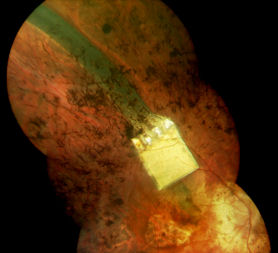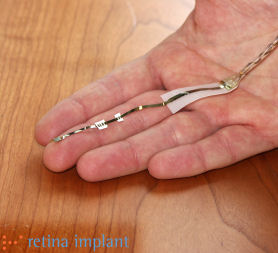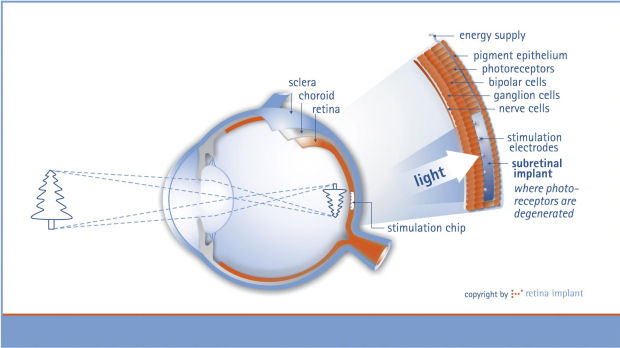Scientists help blind man see again
In a major breakthrough for the blind, scientists have restored a man’s sight with a “bionic eye” for the first time ever, reports Science Correspondent Julian Rush.

Miikka Tertho, from Finland, inherited the disease retinitis pigmentosa, a common degenerative disorder that affects some 200,000 people around the world. At 24, he started to lose his sight. Now 46, he is registered blind.
For three months, Miikka was one of eleven patients testing the retinal implant built by Prof. Dr. Eberhart Zrenner of Tuebingen University in Germany. The 1500 pixel chip, similar to that found in a digital camera, was implanted behind the retina of his left eye where it effectively replaced the light receptors lost as a result of the degenerative disease.
Electrodes on the back of the tiny 3x3mm2 chip passed pulsed signals to his optic nerve that varied according to the amount of light falling on the chip. Previous experiments to restore sight in this way have used a bulky external camera; this is the first time an implanted “bionic eye” has been shown to work successfully.

When the time came to switch on his new bionic eye, Miikka was nervous.
“They told me that I should see dots in my eye, like light bulbs when they pressed the button on the computer,” Miikka said. “I was a bit shaky, but when they hit the button and I could see the dots, I shouted out ‘yes!’ at the top of my voice.”
Miikka quickly learned to “see” with his bionic eye. He went from being able to identify vertical and horizontal lines on a computer screen, to form letters into words, even in one extraordinary moment, correcting the spelling of his name.
In video that dramatically captures the delight of both Miikka and the scientists, the team break into spontaneous applause as Miikka recognises foreign objects such as a banana and distinguishes between a fork, knife and spoon.

Video provided by University of Tuebingen/Retina Implant AG
Writing in the journal “Proceedings of the Royal Society B“, where the results of the pilot study have been published, Professor Zrenner says the results surpassed his expectations.
“The results of this pilot study provide strong evidence that the visual functions of patients blinded by a hereditary retinal dystrophy can, in principle, be restored to a degree sufficient for use in daily life,” he said.
The first trials on UK patients are expected to start in London and Oxford in 2011.
-
Latest news
-
‘I violated my moral compass working for Trump,’ former lawyer testifies3m

-
Working class creatives in film and TV at lowest level in decade5m

-
Israeli police investigating attack on Gaza aid convoy4m

-
Biden announces major tariff increase on Chinese-imported green tech3m

-
‘If NHS can afford it, people with obesity should have Semaglutide,’ says weight loss expert5m

-




